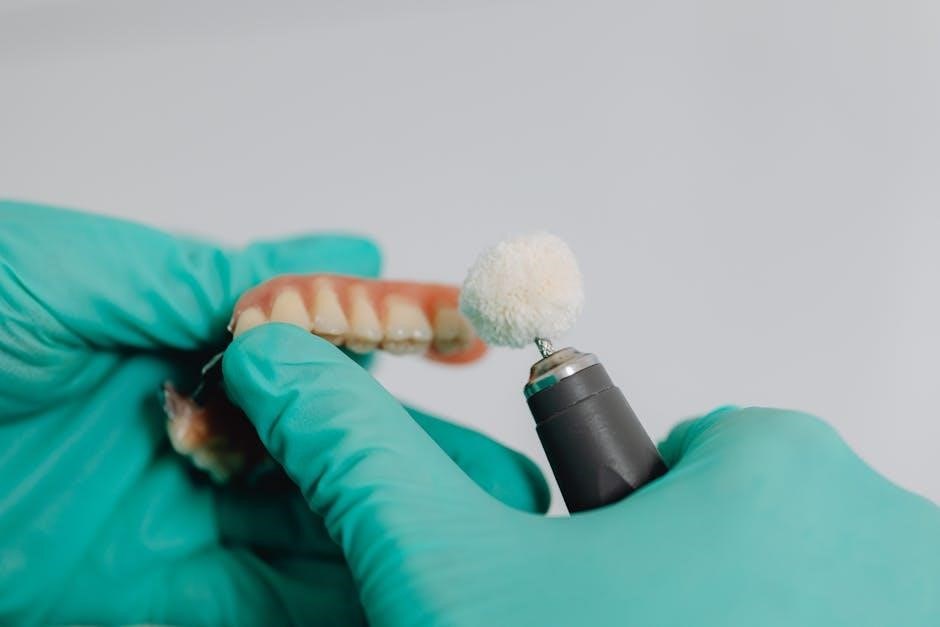
Immediate Post-Surgical Care
After dental implant surgery, avoid disturbing the surgical area. Apply an ice pack to reduce swelling for 15-20 minutes, repeating as needed. Rest and avoid strenuous activities for 24-48 hours. Keep the area clean and avoid rinsing vigorously. Follow prescribed medication and hygiene instructions to promote healing and minimize complications.
1.1 Managing Bleeding and Swelling
Apply an ice pack to the surgical area for 15-20 minutes at a time to reduce swelling. Gently bite on gauze for 30-45 minutes to control bleeding. Avoid spitting or rinsing vigorously for 24 hours. If bleeding persists, replace the gauze or use a damp tea bag. Swelling typically peaks within 48-72 hours but subsides gradually. Monitor for excessive bleeding, as it may require medical attention.
1.2 Rest and Recovery
Rest is crucial after dental implant surgery. Elevate your head with 2-3 pillows for the first 48 hours to reduce swelling. Avoid strenuous activities for 24-48 hours. Stay hydrated with fluids and maintain a soft diet. Monitor your body’s healing progress and avoid any actions that cause discomfort. Proper rest supports optimal healing and minimizes post-operative complications.

Pain Management
Managing pain after dental implant surgery involves prescribed medications and over-the-counter options. Follow your dentist’s instructions to ensure proper healing and minimize discomfort effectively.
2.1 Prescribed Medications
Prescribed medications, such as painkillers and antibiotics, are crucial for recovery. Take them as directed to manage pain and prevent infection. Antibiotics ensure proper healing, while painkillers reduce discomfort. Adhere strictly to the prescribed dosage and schedule to avoid complications and support the healing process effectively.
2.2 Non-Prescription Pain Relief
Over-the-counter pain relievers like ibuprofen or acetaminophen can help manage mild to moderate discomfort. Follow the recommended dosage on the label or as advised by your dentist. These medications can reduce both pain and inflammation, aiding in a smoother recovery. Always consult your dentist before combining medications to ensure safety and effectiveness.

Dietary Recommendations
Stick to a soft food diet for the first week, avoiding hard, crunchy, or spicy foods. Opt for nutrient-rich meals to support healing and overall recovery.
3.1 Soft Food Diet
A soft food diet is essential after dental implant surgery to minimize discomfort and protect the surgical site. Opt for foods like yogurt, mashed potatoes, and scrambled eggs. Avoid chewing directly on the implant area. Choose bland, easily chewable options to reduce irritation. Ensure meals are nutrient-rich to support healing. Gradually introduce softer solids as healing progresses, typically within the first week.
3.2 Avoiding Hard or Crunchy Foods
Avoid hard or crunchy foods like nuts, chips, and raw vegetables for several weeks after surgery. These can dislodge the implant or cause discomfort. Opt for soft, easy-to-chew options to protect the healing site. Cutting food into small, manageable pieces can help minimize strain on the implant area. This precaution ensures proper healing and prevents potential complications during the recovery period.
Oral Hygiene Practices
Keep your mouth clean by gently rinsing with saltwater or prescribed mouthwash. Avoid vigorous rinsing or using harsh products that could disrupt the healing process.
4.1 Rinsing and Cleaning
Avoid rinsing the first day after surgery. After 24 hours, rinse gently with warm saltwater or prescribed mouthwash. Do not use harsh products or vigorous rinsing, as this could dislodge the blood clot. Use a soft toothbrush to clean around the area, ensuring gentle care to promote healing without disturbing the surgical site.
4.2 Brushing Techniques
Use a soft-bristled toothbrush to gently clean around the implant site, avoiding direct pressure. Begin with light strokes, gradually increasing as healing progresses. Avoid using electric toothbrushes or vigorous brushing motions that could dislodge the blood clot. Clean the surrounding teeth normally, but keep the brush away from the surgical area for the first few days. This promotes healing without irritation.
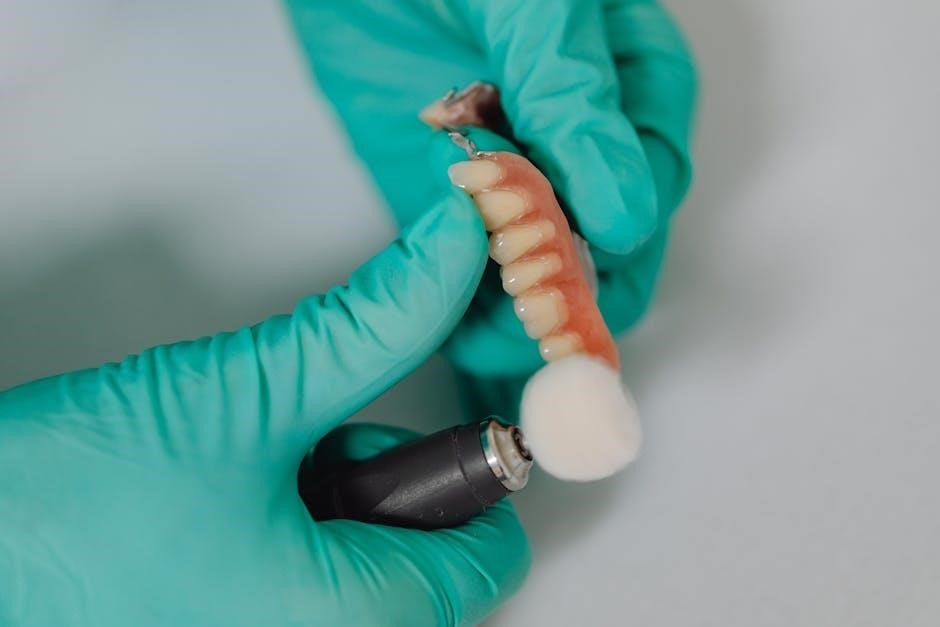
Activity Levels
Avoid strenuous activities for 24-48 hours post-surgery. Rest and limit physical exertion to promote healing. Gradually resume normal activities as comfort allows, ensuring no discomfort or swelling worsens.
5.1 Avoiding Strenuous Activities
Avoid strenuous activities like heavy lifting, bending, or exercise for 24-48 hours after surgery. These can dislodge the blood clot, delay healing, or cause bleeding. Limit physical exertion to promote a smooth recovery and prevent complications. Rest and avoid activities that may strain the surgical site, ensuring the implant integrates properly with the surrounding bone and tissue.
5.2 Resuming Normal Activities
Resume normal activities gradually, typically within a few days post-surgery. Avoid heavy lifting or bending for 48 hours. Light activities like walking or reading are fine. Listen to your body and stop if pain or discomfort arises. Avoid chewing directly on the implant site for 1-2 weeks. Follow your dentist’s guidance for a smooth transition back to daily routines and ensure proper healing of the implant site.
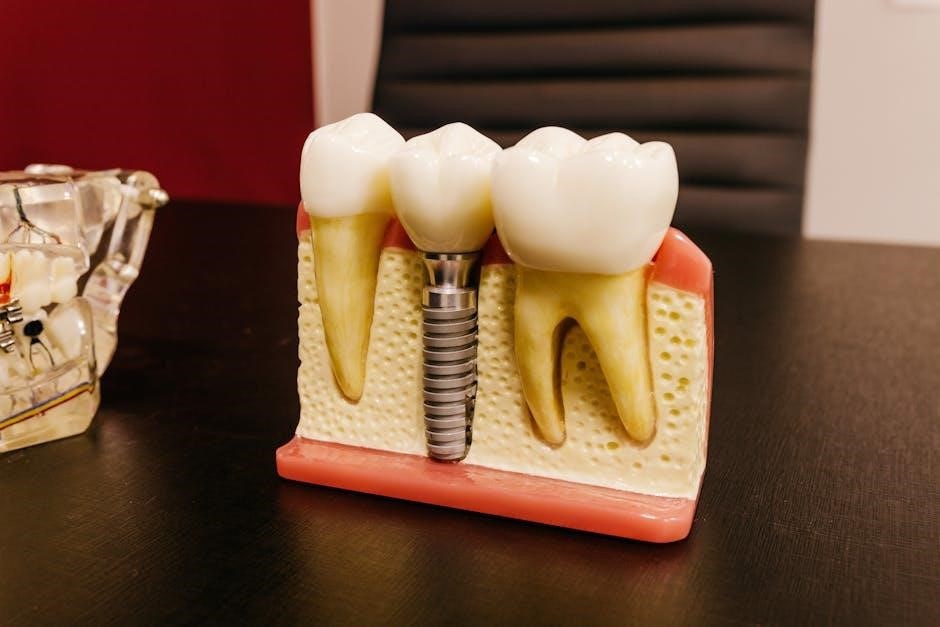
Follow-Up Appointments
Schedule follow-up appointments as directed by your dentist to monitor healing progress. These visits ensure proper integration of the implant and address any concerns. Attend all post-op checks to confirm healing and make necessary adjustments for optimal results.
6.1 Importance of Post-Op Check-Ups
Regular follow-up appointments are crucial for monitoring the healing process and ensuring the implant integrates properly with the bone. These check-ups allow your dentist to assess the surgical site, check for any signs of complications, and make necessary adjustments. Consistent monitoring helps prevent potential issues, ensuring a successful and long-lasting dental implant outcome.
6.2 Monitoring Healing Progress
Regular monitoring ensures proper healing and integration of the implant. Your dentist will use X-rays to assess bone fusion and check for signs of inflammation or complications. These check-ups help confirm the implant is healing as expected, ensuring stability and functionality. Adjustments are made based on findings to optimize the outcome.

Avoiding Harmful Habits
Smoking and alcohol consumption should be avoided for at least 2 weeks and 48 hours, respectively. These habits can delay healing and disrupt blood clot formation.
7.1 Smoking and Healing
Smoking significantly delays healing and reduces blood flow, increasing the risk of implant failure. Avoid smoking for at least 2 weeks post-surgery to prevent complications. Nicotine impairs bone integration, so quitting is crucial for proper osseointegration. Discuss cessation strategies with your dentist to ensure optimal healing and long-term implant success.
7.2 Alcohol Consumption
Avoid alcohol for at least 48 hours after surgery, as it can disrupt blood clot formation and impair healing. Alcohol consumption may prolong recovery and increase the risk of complications. Refrain from drinking until your dentist confirms it’s safe, ensuring proper healing and minimizing risks associated with implant integration and overall oral health.

Managing Surgical Site
Keep the surgical area undisturbed and avoid rinsing vigorously. Gently clean with prescribed solutions, and monitor sutures for signs of issues. Follow specific care routines as directed.
8.1 Avoiding Disturbance
Avoid touching or disturbing the surgical site for at least 24 hours after surgery. Refrain from rinsing vigorously or using straws, as this can dislodge the blood clot. Keep your fingers and tongue away from the area to prevent irritation. Disturbing the site may delay healing or lead to complications. Follow your surgeon’s specific instructions to ensure proper recovery.
8.2 Suture Care
Keep sutures clean and dry to promote healing. Avoid touching or pulling at the sutures, as this can cause damage or infection. Rinse gently with saline solution if recommended by your surgeon. Do not use harsh mouthwashes or abrasive products near the sutures. Follow specific suture care instructions provided by your dentist to ensure proper healing and minimize the risk of complications.
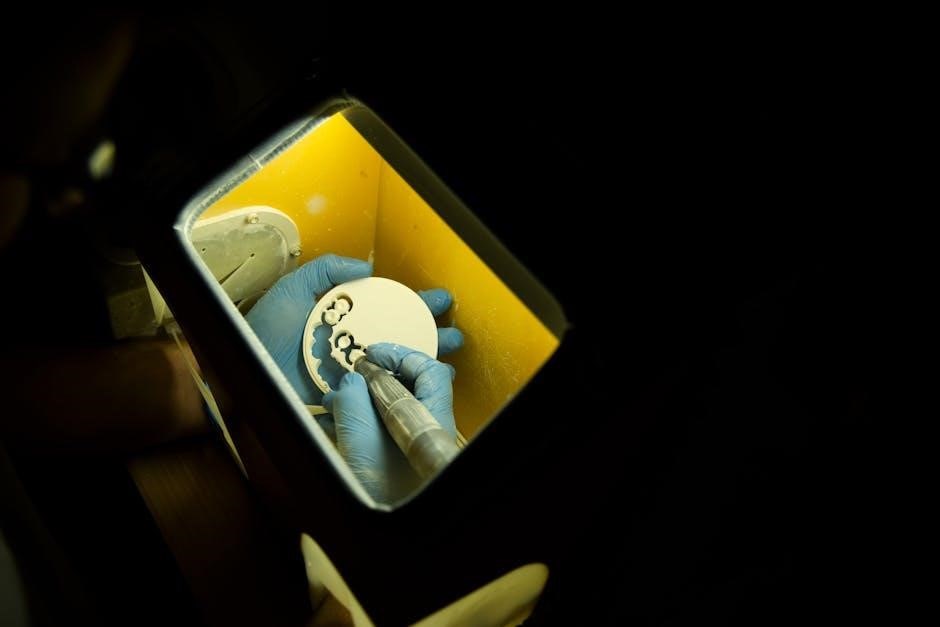
Hydration and Nutrition
Staying hydrated is crucial for healing. Drink plenty of fluids and maintain a soft, nutritionally balanced diet for optimal recovery and comfort after surgery.
9.1 Staying Hydrated
Staying hydrated is essential after dental implant surgery. Drink plenty of water and clear fluids to prevent dehydration and promote healing. Avoid hot beverages for 24 hours and sip liquids gently to minimize discomfort. Proper hydration helps maintain blood flow to the surgical site, supporting the recovery process and reducing the risk of complications. Aim for at least 8-10 glasses of water daily during the initial recovery phase.
9.2 Nutritional Advice
A soft, balanced diet is crucial after dental implant surgery. Opt for foods like yogurt, soup, and mashed vegetables to avoid chewing on the surgical site. Stay hydrated with water and clear fluids. Incorporate protein-rich foods and vitamins to support healing. Avoid alcohol and smoking, as they can hinder recovery. A nutritious diet helps maintain energy levels and promotes a smooth recovery process.
Signs of Complications
Watch for signs of complications, such as increased pain, swelling, redness, or pus around the implant site. Fever or a loose implant may indicate infection. Contact your dentist immediately if these symptoms persist.
10.1 Recognizing Infection
Signs of infection after dental implant surgery include increased redness, swelling, or pus around the implant site. Persistent pain, fever, or a bad taste in the mouth may also indicate infection. If you notice these symptoms, contact your dentist immediately. Untreated infections can lead to serious complications, such as implant failure or bone loss, so early intervention is crucial for proper healing and implant success.
10.2 Excessive Bleeding
Excessive bleeding after dental implant surgery is a concerning sign. If bleeding doesn’t subside within 24 hours or soaks through gauze repeatedly, seek immediate medical attention. Apply firm pressure with clean gauze for 15-20 minutes. Avoid rinsing, spitting, or drinking through a straw, as this can dislodge clots. Contact your dentist if bleeding persists or worsens, as it may indicate complications requiring professional intervention to ensure proper healing.
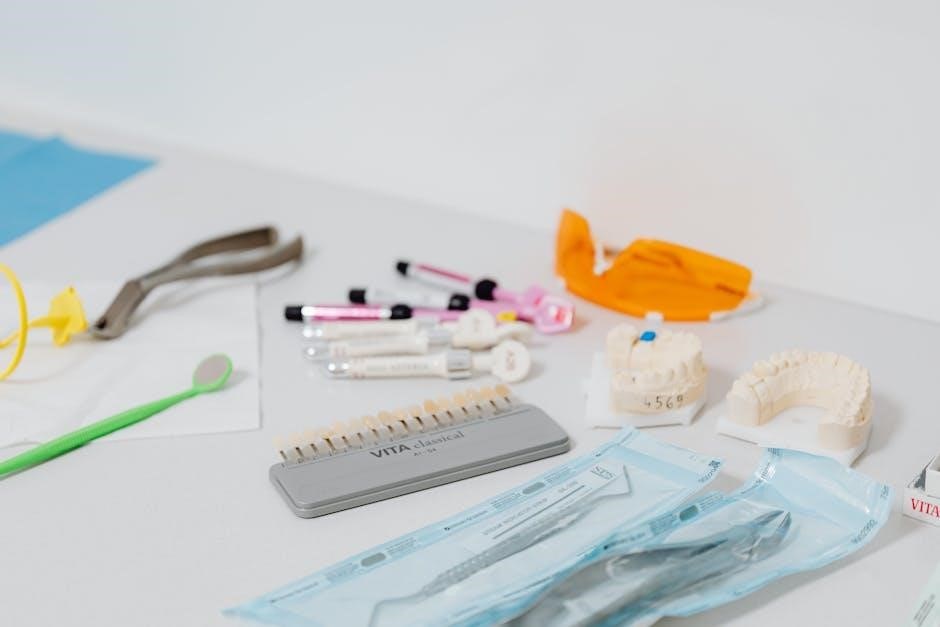
Temporary Prosthetics
Temporary prosthetics are provided to protect healing teeth and restore aesthetics. Handle them gently and avoid chewing directly on the implant site. Follow adjustment instructions carefully.
11.1 Caring for Healing Teeth
After dental implant surgery, prioritize rest and avoid disturbing the surgical area. Use ice packs to reduce swelling, and stick to a soft food diet for at least 24 hours. Gently clean the area with prescribed mouth rinse, avoiding vigorous rinsing. Do not smoke or consume alcohol, as these can hinder healing; Follow all post-op instructions to ensure proper recovery and avoid complications.
11.2 Adjustments and Maintenance
Temporary prosthetics are provided to protect healing teeth during recovery. Avoid chewing directly on the implant site and maintain good oral hygiene. Regular follow-up appointments are essential for monitoring healing progress and making necessary adjustments. Proper maintenance ensures the implant integrates successfully and functions optimally. Attend all scheduled post-op check-ups to guarantee the longevity and stability of your dental implants.
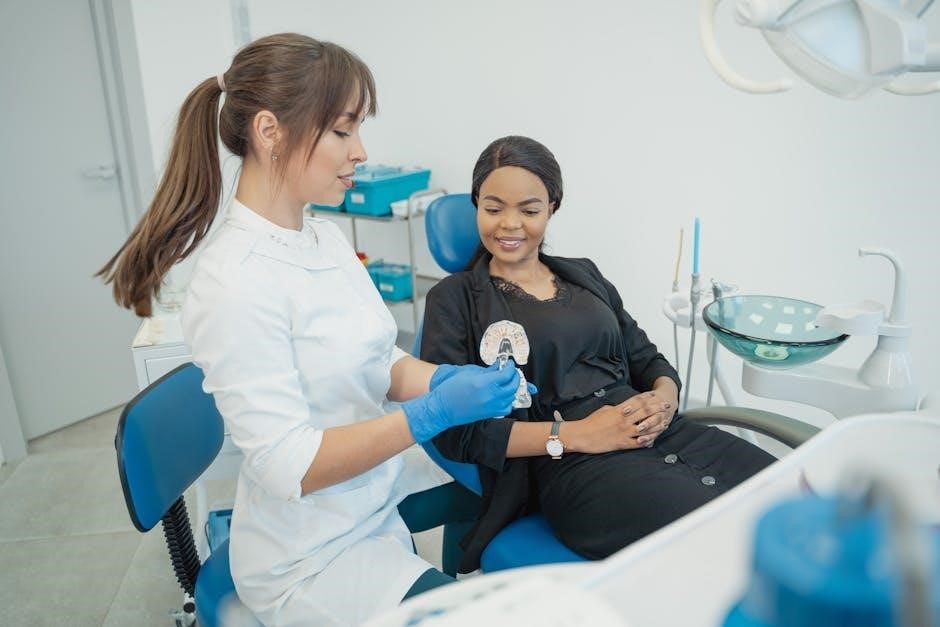
Long-Term Care
Regular dental check-ups are essential for monitoring implant health and ensuring longevity. Maintain good oral hygiene, including brushing and flossing, to prevent complications and support overall oral health.
12.1 Maintaining Implant Longevity
To ensure the longevity of your dental implants, practice consistent oral hygiene, including daily brushing and flossing. Attend regular dental check-ups to monitor implant stability and address any issues early. Avoid chewing on hard objects or ice, as this can damage the implant. A balanced diet rich in vitamins and minerals supports overall oral health and implant durability.
12.2 Regular Dental Check-Ups
Regular dental check-ups are essential for monitoring the health and stability of your implants. Schedule appointments every 3-6 months to ensure proper healing and longevity. During these visits, your dentist will assess implant integration, check for any signs of wear, and provide professional cleaning to maintain optimal oral health and prevent complications.